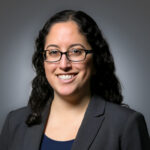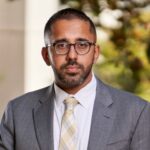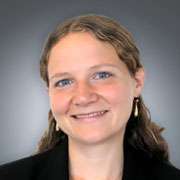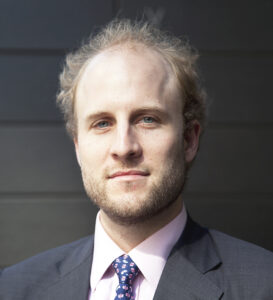This website uses cookies
We use cookies to ensure that we give you the best experience on our website. If you continue to use this site we will assume that you are happy with it.
Jump to:
Jaclyn Kelley-Widmer, Associate Clinical Professor of Law

Jaclyn Kelley-Widmer
Throughout the summer and fall of 2022, 1L Immigration Law and Advocacy Clinic students worked on a variety of cases and projects. One of the clinic’s major endeavors has been to apply for advance parole for DACA recipients, allowing them special permission to travel for educational, employment, or humanitarian reasons. In the last two months, we have had three approvals for advance parole, allowing our clients to travel abroad to Italy, Mexico, and India.
Another focus has been on continuing work for several asylum clients who are at different points in the process and need legal counseling on a variety of issues.
Finally, students have been working on advocacy projects including a research memo for Al Otro Lado, a community organization representing asylum seekers nationwide; and materials to provide legal guidance to undocumented students.
Briana Beltran, Lecturer
Beth Lyon, Clinical Professor of Law

Briana Beltran

Beth Lyon
Over the spring and summer, seven clients received Deferred Action, giving them a formal right to be present in the United States and the option to apply for work authorization and social security numbers. In the fall, Clinic Legal Fellow Reina Fostyk set up her new office in Cooperstown, NY. Fostyk is working with a team of students to launch an access to justice project in the Mohawk Valley Region. They are handling our first two cases in Montgomery County, NY, and they are also consulting with community-based organizations, adjudicators, and legal services providers to set the clinic’s priorities for providing legal services in the area.
Along with coauthor Lesbia Marleny Sis Chén, Lyon published “Acceso Lingüístico a la Justicia y Debido Proceso,” in Due Process of Law in the 21st Century, Luiz Dellore, ed. The book chapter summarizes the emerging international law standards on language access to justice for groups that do not speak an official or favored language, comparing the legal frameworks of Guatemala and the United States.
In January 2022, Lyon appeared on a panel, “Teoría Crítica del Derecho Migratorio, Curso Verano: Teoría Crítica del Derecho y Justicia Social en las Américas.” In May, she spoke on a panel entitled “Incorporating Critical Theory into Clinical Courses using Critical Justice: Systemic Advocacy in Law and Society” at the AALS Conference on Clinical Education. In August, she was a keynote speaker for the Escuela Libre de Derecho conference on “The Role of Law School Clinics in Addressing Predatory Migration Regimes.” In September, Lyon co-organized a conference entitled “Bridging the Scientific-Legal Divide in the Treatment of Trauma in Immigration,” where she copresented on “Improving Accurate Health Data Collection Among Child and Youth Farmworkers: A Pilot Qualitative Study.”
G.S. Hans, Associate Clinical Professor of Law
Mark Jackson, Adjunct Professor of Law
Heather Murray, Managing Attorney of the Local Journalism Project
Christina Neitzey, Stanton Fellow (not pictured)

Guatam Hans

Mark Jackson

Heather Murray
The First Amendment Clinic had an active litigation docket over the past few months and also continued to expand its transactional assistance to journalists, including last year’s launch of an ongoing partnership with Cornell’s Entrepreneurship Law Clinic.
The clinic received a precedent-setting decision in August from the Second Circuit concerning the scope of 2016 amendments to the Freedom of Information Act. In the first ruling on this important issue, the court agreed that the amendments require agencies to disclose confidential commercial and financial information they obtain from third parties unless they can show that disclosing the confidential material will cause affirmative harm to third-party commercial interests.
Alumna Lindsey Ruff ’19 was honored this year as the inaugural recipient of the clinic’s Jackson Distinguished Alumni Award for her role representing Justice 360 in litigation against the state of South Carolina. The clinic, with Cornell’s Capital Punishment Clinic and Boies Schiller Flexner LLP, represented Justice 360 in seeking access to the state’s lethal injection cocktail and protocols. Ruff argued before the Fourth Circuit in May. The court ultimately denied the clinic’s challenge to an execution-choice law on standing grounds.
The clinic obtained the unsealing of court records this August on behalf of the York Daily Record demonstrating that York County and prison health care contractor PrimeCare Medical, Inc. defendants settled a wrongful death suit brought by the estate of Veronique Henry for $200,000. York County had previously disclosed that its portion of the settlement was $5,000 and had refused to release full settlement details. The clinic and the Reporters Committee filed a motion to intervene and unseal the federal court records in July. PrimeCare and the county declined to file opposition briefs, prompting the court to unseal the settlement records.
The clinic also represented Investigative Post, a Buffalo-based outlet, and their coverage of a controversy concerning whether the city should be building a new Buffalo Bills stadium. Our client sought access to the unredacted version of an engineering study related to the existing Buffalo Bills football stadium that the County of Erie refused to disclose. Shortly after filing suit against the county, the clinic successfully obtained the removal of a significant number of redactions from the study with assistance from students Kasper Dworzanczyk ’22 and Olivia Foster ’22 and received permission for our client to access a full copy for reporting purposes. While the judge denied our request to release the study in its entirety, the suit itself resulted in much more information being provided to the public about the potential cost of renovating the stadium.
Following the killing of George Floyd and the racial justice protests that followed, the Oklahoma legislature passed a bill that significantly expanded the scope of potential criminal liability under the state’s riot statute for First Amendment-protected speech. Clinic students Connor Flannery ’23 and Foster drafted portions of an amicus brief in a suit challenging this law. Separately, Oklahoma officials have used the state’s preexisting riot laws to prosecute protestors for criticizing law enforcement, such as several racial justice activists who yelled expletives at an officer. The clinic is representing these activists along with co-counsel — the Oklahoma ACLU — in a challenge to the constitutionality of Oklahoma’s riot statute. Clinic students Olivia Stein ’22, Charlene Hong ’23, Flannery, Steve Mirsen ’23, and Cameron Misner ’24 and summer fellows Tatiana Smith and Nneka Onyekwuluje worked on either the complaint or the subsequent briefing challenging the riot statute. The suit alleges that the state’s definition of “riot” is unconstitutionally vague and overbroad in violation of the First Amendment. The clinic and the ACLU filed an opposition to the state’s motion to dismiss and a reply brief in support of our motion to preliminarily enjoin enforcement of the state’s riot statute in September.
After clinic student Andrew Gelfand ’23 argued an access matter in the Vermont Superior Court in February on behalf of client VTDigger, the lower court issued a decision denying our motion to compel. The clinic with co-counsel Cornell Dolan and the ACLU-VT recently filed an appellate brief in this matter in the Vermont Supreme Court arguing that our client is entitled to information detailing precisely what documents the State of Vermont has been withholding from a public records production and on what basis. The documents relate to our client’s coverage of a scandal involving the state’s handling of the federal EB-5 immigrant investors program. Clinic students Gelfand and Lauren Kazen ’23 are working on a reply brief to be filed in the coming months.
The clinic and co-counsel RCFP recently filed a petition to appeal a decision in an access case after the Commonwealth Court of Pennsylvania ruled that the Pennsylvania State Police was not obligated to obtain its text messages and voicemails from a third-party communications provider. If that decision is not overturned, it could effectively cut off access to all text messages, voicemails, or other electronic communications that state agencies choose to store with telecommunications companies or other third-party providers. Clinic student Steven Marzagalli ’22 presented an oral argument on this matter before the Commonwealth Court in the spring and also conducted the direct examinations of two state witnesses.
The clinic represented a self-proclaimed Republican gadfly who had been blocked by the Democratic Westchester County Executive from the County Facebook page. Clinic students Flannery and Maria Kearns-Galeano ’23 drafted a demand letter and ultimately were successful in convincing Westchester County to reverse its decision to block our client and to modify its social media policies to make them more consistent with First Amendment values.
In the continuing partnership with the Cornell Entrepreneurship Law Clinic, the clinic will provide transactional legal advice to a number of local journalist clients, including Conecta Arizona and Kansas City Defender.
Elizabeth Brundige, Clinical Professor of Law
Lorelei Lee, Justice Catalyst Fellow (not pictured)

Elizabeth Brundige
The Bella Project for People in the Sex Trades began its third year hosted by the Gender Justice Clinic. Clinic students are working in partnership with Hacking//Hustling, the Colorado Entertainers Union, Lysistrata Mutual Care Collective, and the Max Planck Institute on a sex worker-led research project addressing the prevalence of financial discrimination by banks and fintech platforms against people in the sex trades, with the aim of producing a report that will offer potential interventions. Data collection in seven cities is being led by street-based and drug-using sex workers trained in research ethics by other sex workers who have expertise in human subject research and data analysis. Clinic students support this research by analyzing legal, historical, economic, cultural, and regulatory influences on financial discrimination.
The Bella Project student clinicians also began work in partnership with Reframe Health and Justice examining the impact of third-party criminalization under both full-criminalization and partial-criminalization regulatory models.
The Gender Justice Clinic is also continuing to represent a gender justice activist and her family in their affirmative asylum cases, which the clinic first undertook in the spring in collaboration with the Asylum and Convention Against Torture Appellate Clinic and the 1L Immigration Law and Advocacy Clinic. This fall, the clinic is also representing a feminist youth activist in her affirmative asylum case. Students are coordinating evidence gathering, legal research, and writing in support of all these cases.
Another long-term clinic initiative involves advocating for improvements in the ways that institutions prevent and respond to gender-based violence. This initiative includes a research and advocacy project — undertaken in coordination with the ACLU’s Women’s Rights Project — that seeks to investigate and address gaps and challenges in the Peace Corps’ efforts to prevent and respond to sexual violence against its volunteers. This semester, students are analyzing the data collected last year through interviews and an online survey and writing a report that aims to identify potential actions to strengthen policies and practices in support of future volunteers.
In September, the clinic led a workshop on reproductive justice following the Supreme Court’s June 2022 ruling in Dobbs v. Jackson Whole Women’s Health Organization, which ended the federal constitutional right to abortion. The event was the second part of a semester-long, campus-wide series that includes a variety of events related to the Dobbs decision, spanning education-based workshops to advocacy-based events.
Lorelei Lee, the clinic’s justice catalyst fellow, was invited as a member of Hacking//Hustling to participate in the first Tech Against Trafficking Summit at Seattle’s Amazon headquarters. They spoke with representatives from Amazon, BSR, MIT’s Lincoln Laboratory, the Global Initiative Against Transnational Organized Crime, and the Global Fund to End Modern Slavery about the lack of representation and input by survivors in development of tech approaches to trafficking and the subsequent increased vulnerability of criminalized and precarious workers caused by tech’s primary trafficking responses: surveillance and exclusion. In November, Lee will be giving a talk alongside Hacking//Hustling cofounder Danielle Blunt on lessons from sex worker movements for reproductive justice movements on surviving criminalization of one’s body.
In spring 2022, Professor Liz Brundige taught a new course on international human rights law and advocacy to undergraduate students at Cornell. She also reprised her online summer human rights course for high school and undergraduate students from around the world. In May, Brundige was selected by the Cornell Law School student body as the recipient of the annual Anne Lukingbeal Award, which is presented to a member of the faculty or staff who has demonstrated outstanding commitment to the advancement of women in the legal profession.
Angela Cornell, Clinical Professor of Law

Angela Cornell
Labor organizing and strike activity have been surging, and it has been a busy time for the Labor Law Clinic. We have had a range of interesting labor cases, terminations in union organizing drives that have led to unfair labor practice charges before the National Labor Relations Board (NLRB), and terminations linked to other protected concerted activity. We had a nice settlement in a termination linked to medical marijuana, back pay, and client settlements of $124,000, and we’re optimistic about a couple of pending cases. We have had two probable cause determinations before the New York State Human Rights Division related to gender identity and disability, and a partial victory with a three-day arbitration on behalf of a terminated worker. We just started two new arbitration cases involving workplace health and safety issues.
Last spring, our international labor law projects were shadow reports submitted under the U.N. Universal Periodic Review process on freedom of association and labor violations in the Philippines, Indonesia, and India. In all, autocratic administrations challenge workers’ collective rights and freedom of association.
Angela Cornell has a book chapter in an edited volume that should be published in December. The chapter is “Labor Law Unrealized: The Stifling of Workers’ Collective Rights in the U.S.” in The Future of Labor and Employment Law: International and Comparative Perspectives (Bruyland-Larcier Publishing). She has also had a few conference panels and roundtable discussions related to the new coedited volume, the Cambridge Handbook of Labor and Democracy, published earlier this year. She was invited to present on the topic of labor and democracy at the American Bar Association Labor and Employment Law Conference in Berlin, had a roundtable discussion on the book at Law and Society, as well as the Labor and Employment Relations Association annual conference. On the book topic, she was asked to submit a blog post at the National Endowment for Democracy, and a podcast with the Solidarity Center. Related to clinical work, she organized a panel at the Association of American Law Schools’ clinical conference on “Representing Workers Through the NLRB Administrative Process,” which included the perspectives of clinicians who have filed charges with the board and included the deputy general counsel of the NLRB.
William Niebel, Tenants Advocacy Attorney and Adjunct Professor of Law
Yusong Jin LL.M. ‘22, Tenants Advocacy Fellow (not pictured)

William Niebel
In its third year, the Tenants Advocacy Practicum continues to expand, working to bridge the housing justice gap in Ithaca and the surrounding counties. This fall, William Niebel, who has been teaching the practicum as an adjunct professor since 2020, began working with it on a full-time basis as the inaugural Tenants Advocacy Attorney, allowing the practicum to handle more cases. The clinic also hired its first fellow, Yusong Jin LL.M. ‘22, who is providing legal assistance to local tenants in addition to supervising practicum students. Both positions are funded by a new grant from the New York State Office of Temporary and Disability Insurance through a subcontract with Legal Assistance of Western New York. In addition, five of the law students from the spring returned to continue honing their advocacy skills while serving local community tenants in need. Four of these students have already been able to provide full representation to tenants in Ithaca City Court. Finally, 11 students are enrolled in the primary course this fall, bringing the total to 16 students currently enrolled.
In one recent case, student attorneys Jennifer Seidman and Veronica Blascoe successfully negotiated the recovery of $2,750 for their client. The landlord had unlawfully collected a security deposit and two advance rent payments up front, totaling three months’ rent ($2,250). Due to COVID, the tenant did not end up living in the apartment. Even though the landlord successfully rented the apartment to someone else, the landlord refused to return any of the tenant’s money for more than two years. The student attorneys filed the case in the Ithaca City Court and, after many hours of research and preparation, were ultimately able to recover the full amount of the deposit, rent, and an additional $500 in punitive damages.
Niebel’s article, “The Process Due When Rent is Due: Residential Nonpayment Evictions in New York after COVID-19,” was published in the New York Real Property Law Journal, vol. 49, no. 2 (fall 2021), and is serving as an invaluable reference for judges, practitioners, and the students in the practicum.
Ian Kysel, Assistant Clinical Professor of Law

Ian M. Kysel
The Transnational Disputes Clinic (TDC) launched this fall. In this new clinic, students use strategic litigation to influence the progressive development of the law. Students learn key skills through acting as counsel for parties as well as for amici curiae in disputes that implicate the protection of fundamental rights. The TDC is one of the first clinics at any law school to incorporate a sustained focus on investor-state dispute settlement into its docket.
In its inaugural semester, a team of students is seeking to intervene in an investment dispute against a Balkan state pending at the International Centre for Settlement of Investment Disputes. They seek to represent civil society organizations and submit a brief to the tribunal on media and press freedoms. Another team is working with refugees housed on a military base and pursuing advocacy asserting domestic and international law claims to promote improved conditions and treatment as well as resettlement.
Kysel joined the Law School’s faculty this year after three years as visiting codirector of the Asylum and Convention Against Torture Appellate Clinic, a visit at the University of Oxford as an academic visitor at the Faculty of Law, and a Plumer Visiting Research Fellow at St. Anne’s College. In the past year, Kysel published a book chapter on the protection of the rights of all migrants during the COVID-19 pandemic; coedited and published in a symposium in the Cornell International Law Journal Online on the same topic; and blogged — along with Cornell immigration Postdoctoral Associate Janine Prantl — in EJIL:Talk! about the treatment of refugees fleeing the war in Ukraine. This summer, Kysel helped organize a group of former Aryeh Neier Fellows to coauthor a report on racial discrimination in the United States, which was submitted jointly by the American Civil Liberties Union and Human Rights Watch to the U.N. to support a review of U.S. compliance with its rights obligations; he published an op-ed on the project in The Hill. Kysel recently returned from meetings with the African Commission on Human and People’s Rights in The Gambia. He is leading a team at Cornell’s International Migrants Bill of Rights Initiative to help the commission develop guiding principles on the rights of all migrants.